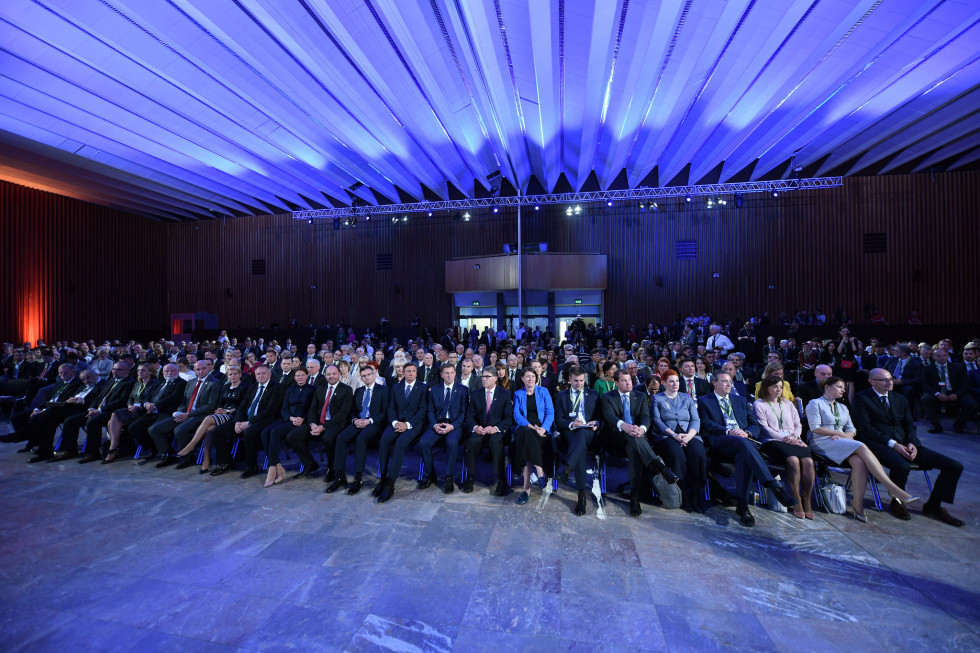Regional connectivity and compliance with EU at heart of first day of 3SI Business Forum
- Ministry of Foreign Affairs
The main conclusion of the first day of the Business Forum was that the effectiveness of the Three Seas Initiative hinged on its compatibility with European policies.
Pointing to the sustainable development of the EU as the guiding principle underlying all 3SI actions, the participants of the presidential panel called for increased focus on growth, investment and stable institutions. At the panel, President Pahor was joined by Presidents Rumen Radev of Bulgaria, Kolinda Grabar-Kitarović of Croatia, Miloš Zeman of the Czech Republic, Kersti Kaljulaid of Estonia and Andrzej Duda of Poland, along with Péter Szijjártó, Hungarian Minister of Foreign Affairs and Trade, and US Secretary of Energy Rick Perry.
The opening addresses by the Slovenian Minister of Infrastructure, Alenka Bratušek, and US Secretary of Energy Rick Perry, introduced the panel on energy. The panel was dedicated to the challenges and opportunities for governments and energy stakeholders in the transition to a low-carbon society in the 3SI countries, elsewhere in the EU and in the world at large. In this field, five megatrends will have to be embraced, i.e. decarbonisation, democratisation, digitalisation, decentralisation (accessibility), and deregulation, as underlined by Minister Bratušek. As regards the reliability of supply, Secretary Perry and Piotr Naimski, Secretary of State at the Polish Prime Minister’s Chancellery, highlighted that countries are facing natural limitations and limited resources, while it is also vital to prevent any excessive dependence on one energy source.
The panel dedicated to innovation praised the achievements of the region, which boasts an economic growth nearly twice as high as that of the EU. Innovation was hailed as one of the main drivers of growth, enhancing competitiveness and trade. The stories behind five successful ICT companies revealed the quality of the education systems of the region. The panellists pointed to the issues of poor infrastructure, regulation, red tape, risk likelihood, and lack of capital. Aleš Cantarutti, State Secretary at the Ministry of Economic Development and Technology, spoke of the necessity to ensure responsiveness of policy makers to the needs of entrepreneurs. He called for active involvement in drafting the EU’s new common industrial policy and endorsed the establishment of a 3SI investment fund.
The high-level guests on the transport connectivity panel, held in the afternoon, discussed the importance of good transport infrastructure for the efficient and sustainable mobility of persons and goods. They pinpointed the resilience of transport networks as a lever for demonstrating economic and, indirectly, political power on the world stage. In her opening remarks, European Commissioner Violeta Bulc outlined the main European transport policies and the core Trans-European Networks (TEN-T) in the countries covered by the Initiative. The needs of the 3SI, which may have been overlooked in the past, can be incorporated into the upcoming revision of the TEN-T network, planned for 2021. The panel noted that Slovenia is a major hub along the Baltic–Adriatic and Mediterranean corridors, and thus will play an important role in improving the connectivity of the 3SI region.
The debate on digital transformation and cybersecurity confirmed that Europe needs a balanced, modern and resilient digital infrastructure. This was seen not only as essential for reasons of cyber security, but also as a great opportunity for the economy.
A status report on the projects carried out within the Initiative will be published at the end of the first day of the Forum. A list of priority interconnection projects was one of the main outcomes of last year’s Bucharest Summit. It encompasses 48 projects intended to boost connectedness between the participating countries in transport links, energy, and the digital sphere, of which five are Slovenian: construction of the second railway track between Koper and Divača, reconstruction of the Ljubljana railway junction, establishing a gas pipeline connection between Slovenia and Hungary, improving the electric grid between Slovenia and Croatia, and the 5G digital highway.


